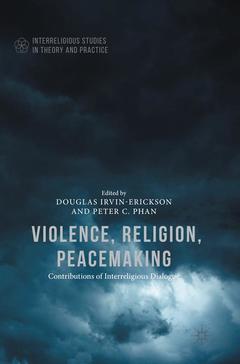Description
Violence, Religion, Peacemaking, Softcover reprint of the original 1st ed. 2016
Interreligious Studies in Theory and Practice Series
Language: English
Subject for Violence, Religion, Peacemaking:
Keywords
Religion; Violence; Peace; Peacebuilding; Irreligious dialogue
Violence, Religion, Peacemaking
Publication date: 06-2018
Support: Print on demand
Publication date: 06-2018
Support: Print on demand
Violence, Religion, Peacemaking
Publication date: 09-2016
Support: Print on demand
Publication date: 09-2016
Support: Print on demand
Description
/li>Contents
/li>Biography
/li>
This volume explores how religious leaders can contribute to cultures of peace around the world. The essays are written by leading and emerging scholars and practitioners who have lived, taught, or worked in the areas of conflict about which they write. Connecting the theory and practice of religious peacebuilding to illuminate key challenges facing interreligious dialogue and interreligious peace work, the volume is explicitly interreligious, intercultural, and global in perspective. The chapters approach religion and peace from the vantage point of security studies, sociology, ethics, ecology, theology, and philosophy. A foreword by David Smock, the Vice President of Governance, Law and Society and Director of the Religion and Peacebuilding Center at the United States Institute of Peace, outlines the current state of the field.
Foreword. Religion and Cultures of Peace; David Smock, Vice President of the United States Institute of Peace, USA.- Introduction. Interfaith Contributions to Nurturing Cultures of Peace; Douglas Irvin-Erickson, George Mason University, USA.- 1. Peacekeeping, Peacemaking, Peacebuilding: An Interreligious Spirituality for Just Peace; Peter C. Phan, Georgetown University, USA.- 2. Sprit Cults, Religion, and Performative Peace in Cambodia; Douglas Irvin-Erickson, George Mason University, USA.- 3. From Tourist to Friend: Vulnerability and Accountability in Short-term International Peacemaking Delegations; Sarah E. MacDonald, Emory University, USA.- 4. Radical Love and Forgiveness as Foundation of Reconciliation: A Theological Imagination for GKI Yasmin Case in Indonesia; Hans Abdiel Harmakaputra, Boston College, USA.- 5. Remembering Peace in Ecological and Economic Terms; Elizabeth Whiting Pierce, Emory University, USA.- 6. Historical and Ecological Injustices through the Lens of Genocide: The United Church of Canada’s Acts of Contrition and the Project to Decolonize North America; Jeff Benvenuto, Rutgers University, USA.- 7. Political Islam and the Darfur Conflict: Religious Violence and the Interreligious Potential for Peace in Sudan; Adeeb Yousif, George Mason University, USA.- 8. Armed Peacebuilding: The Peacebuilding Aspects of Counterinsurgency; Matthew Ridout, Hartford Seminary, USA.- 9. Religion as a Catalyst for Peace Building in Jos, Plateau State North Central Nigeria; Ezekiel Abdullahi Babagario, Baptist Theological Seminary, Kaduna, Nigeria.- 10. A Critical Analysis of the NeoConfucian Vision of Harmony and Its Applicability to Interreligious Peacebuilding; Sungrae Kim, Graduate Theological Union, Berkeley, California, USA.
Douglas Irvin-Erickson is Fellow of Peacemaking Practice at The School for Conflict Analysis and Resolution at George Mason University, USA, where he directs the Genocide Prevention Program and teaches in the field of conflict analysis and resolution.
Peter C. Phan, who has earned three doctorates, is the inaugural holder of the Ignacio Ellacuria Chair of Catholic Social Thought at Georgetown University, USA. His research deals with the theology of icon in Orthodox theology, patristic theology, eschatology, the history of mission in Asia, and liberation, inculturation, and interreligious dialogue. His writings have been translated into Arabic, French, German, Italian, Polish, Portuguese, Romanian, Serbian, Spanish, Chinese, Indonesian, Japanese, and Vietnamese, and have received many awards from learned societies.
© 2024 LAVOISIER S.A.S.



